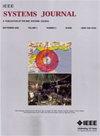Architecting Path Selection Method for Incremental Evolution in System-of-Systems
IF 4.4
3区 计算机科学
Q1 COMPUTER SCIENCE, INFORMATION SYSTEMS
引用次数: 0
Abstract
Architecture design for system-of-systems (SoSs) is a complex challenge due to interdependencies, uncertainties, and the large design space. The evolutionary nature of SoSs necessitates a multistage architecting process, adding further complexity. This article, thus, proposes a deep reinforcement learning based evolutionary architecture path selection method that considers uncertainties and interdependency. The approach employs an architecture framework to guide the design and defines SoS architecture decisions as the addition of systems and the allocation of operational architecture to physical architecture across sequential stages. Capability evaluation leverages a capability-activity-system structure, supported by a functional dependency network analysis method. Utilizing a deep neural network as a functional approximator to predict future SoS capability, the article develops a proximal policy optimization (PPO) algorithm that balances immediate and future needs. Applied to a mosaic warfare-oriented naval antisubmarine SoS, the proposed method outperforms heuristic optimization techniques by achieving higher SoS capability, reduced instability, and fewer violations of budget and intermediate requirements constraints in both deterministic and stochastic scenarios. These results highlight the PPO method's effectiveness in addressing SoS architecting path selection challenges under uncertainty.系统-系统中增量进化的架构路径选择方法
由于相互依赖性、不确定性和较大的设计空间,系统的体系结构设计是一项复杂的挑战。soa的进化本质需要一个多阶段的架构过程,这进一步增加了复杂性。因此,本文提出了一种考虑不确定性和相互依赖性的基于深度强化学习的进化架构路径选择方法。该方法使用体系结构框架来指导设计,并将SoS体系结构决策定义为系统的添加以及跨顺序阶段将操作体系结构分配到物理体系结构。能力评估利用由功能依赖网络分析方法支持的能力-活动-系统结构。利用深度神经网络作为函数逼近器来预测未来的SoS能力,本文开发了一种平衡当前和未来需求的近端策略优化(PPO)算法。应用于面向马赛克战争的海军反潜SoS,该方法优于启发式优化技术,在确定性和随机场景下实现更高的SoS能力,减少不稳定性,减少违反预算和中间需求约束的情况。这些结果突出了PPO方法在解决不确定性下SoS架构路径选择挑战方面的有效性。
本文章由计算机程序翻译,如有差异,请以英文原文为准。
求助全文
约1分钟内获得全文
求助全文
来源期刊

IEEE Systems Journal
工程技术-电信学
CiteScore
9.80
自引率
6.80%
发文量
572
审稿时长
4.9 months
期刊介绍:
This publication provides a systems-level, focused forum for application-oriented manuscripts that address complex systems and system-of-systems of national and global significance. It intends to encourage and facilitate cooperation and interaction among IEEE Societies with systems-level and systems engineering interest, and to attract non-IEEE contributors and readers from around the globe. Our IEEE Systems Council job is to address issues in new ways that are not solvable in the domains of the existing IEEE or other societies or global organizations. These problems do not fit within traditional hierarchical boundaries. For example, disaster response such as that triggered by Hurricane Katrina, tsunamis, or current volcanic eruptions is not solvable by pure engineering solutions. We need to think about changing and enlarging the paradigm to include systems issues.
 求助内容:
求助内容: 应助结果提醒方式:
应助结果提醒方式:


